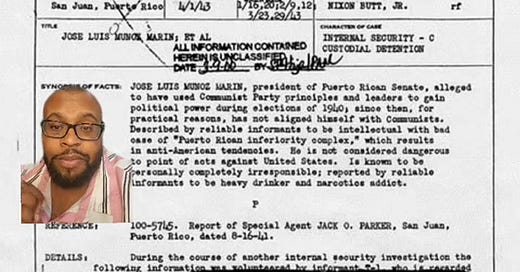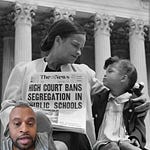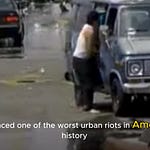From the 1930s until 1987, the Puerto Rican Police Department, in conjunction with the FBI, conducted one of the longest and most invasive secret surveillance operations in U.S. history—targeting thousands of Puerto Ricans simply for their political beliefs.
It was called "Las Carpetas."
Translated literally, it means "the files."
These carpetas were dossiers—painstakingly detailed records—on anyone suspected of being sympathetic to Puerto Rican independence. Teachers, students, artists, doctors, religious leaders, journalists, and even ordinary citizens found themselves under the government’s watchful eye. If you marched for justice, you were watched. If you taught Puerto Rican history in your classroom, you were watched. If you didn’t pledge allegiance to the American flag? Watched.
Agents followed people to their jobs, photographed them at family events, and recorded private conversations. Some were blackballed from jobs. Others were arrested without cause. Lives were destroyed—not because they committed crimes—but because they believed Puerto Rico should be free.
The FBI called this program COINTELPRO. On the island, it became a fact of life—an open secret whispered about in fear. The government treated advocacy for Puerto Rican self-determination as a threat, not a right.
But in 1987, something remarkable happened.
Hundreds of Puerto Ricans began to fight back. Lawsuits were filed. Protesters demanded accountability. Eventually, the government admitted to the surveillance and agreed to release the carpetas. What people found was shocking—thousands of pages of handwritten reports, photos, transcripts of phone calls, and informant logs. Children of the surveilled discovered that even their playdates had been noted by police.
Today, many of those affected are still alive. Some refuse to speak publicly—still afraid. But others have shared their stories, showing how surveillance wasn’t just about intelligence gathering—it was about control.
And here's the truth:
The surveillance didn’t end in 1987.
It simply changed forms.
From racial profiling in airports to the digital tracking of activists, the spirit of Las Carpetas lives on. That’s why it’s critical to remember this history—not just for Puerto Rico, but for every community that has been targeted for daring to dream of liberation.
If stories like this matter to you—stories that challenge power, center the marginalized, and refuse to let history be forgotten—consider becoming a paid subscriber.
Your support allows me to keep doing this work independently.
Gracias always.
✊🏽 Stay loud. Stay informed. Stay free.












Share this post